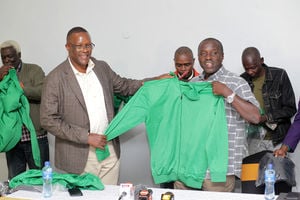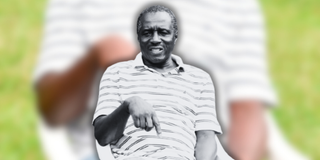
Football legend Austin Origi Oduor during an interview at Makunga village in Kakamega county on April 16, 2023.
I vividly remember the exact spot I sat at on that epoch making Saturday, 5 November 1987 at the Moi International Sports Complex Kasarani as Gor Mahia captain Austin “Makamu” Oduor lifted aloft the Nelson Mandela Cup, having received it from President Daniel arap Moi a few moments earlier.
It was the culmination of a nail biting campaign that had stretched the players and coach Jack Johnson to their limits.
As supporters, we had also had a topsy-turvy run, following the epic continental competition. The Kenyan glamour boys had vanquished the super proud Esperance of Tunisia.
Just two weeks earlier, for example, we had followed in great excitement and consternation as Isaya Omondi “Janabi” chased an Esperance player who had played rough on him, a fist at the ready right into the stands – and supporters -- of the offenders home stadium.
The stakes were simply high and the tempers flew all around the pitch whenever Gor was playing.
“Janabi” is Dholuo for prophet and Isaya got his baptism name from the eighth century BC Israelite man of God, Isaiah.
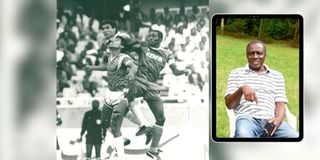
Football legend Austin Origi Oduor at a past match.
He says that the holding together of the team and its final triumph at the continental stage was, in many ways, attributable to the leadership of Austin, who passed away this week on Tuesday.
“Austin (Oduor) was a born leader who took his work very seriously. He was a natural captain, and we found it easy following him as our leader,” says Janabi who has since followed in the footsteps of his biblical namesake, Prophet Isaiah, and become a practising Christian in the Anglican Church.
Starting off as a defender and later deployed by coach Johnson as a destroyer -- a defending midfielder whose work is to destroy moves from the opposing team -- it was only natural that Janabi would interact more with Oduor, a formidable defender both at Gor Mahia and the national team Harambee Stars.
Peter Dawo “Omuga” (rhino) was the poster boy of Gor Mahia’s 1987 Nelson Mandela Cup campaign.
The man who had a million dollar worth of head if the goals he scored are anything to go by says Oduor was both strict and friendly -- strict in making sure his teammates turned up for practise on time and friendly in making players, especially young newcomers felt at home.
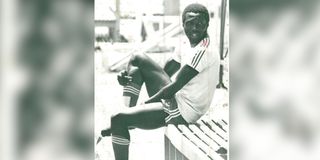
Football legend Austin Origi Oduor during a past event.
“I joined in 1986 and found him there as an already established player. He was very welcoming and I found myself feeling at home in this big club the very first weeks I started training with them,” says Dawo.
“We then toured West Germany and later Brazil as part of Harambee Stars preparations for the 1988 Africa Cup of Nations, and home and away, Austin was a great person both as a human being and a player,” Dawo remembers.
In that iconic team of 1987, there was a new and strange partnership forged between Dawo and defender Tobias Ocholla. Never before in Kenyan football had such a combination ever been witnessed where Ocholla would take all throw-ins and they would somehow land on Dawo’s head who would turn them into goals, to the utter ecstasy of the fans.
Ocholla says Oduor’s leadership at Gor made it possible for all the players to thrive. Ocholla, who joined Gor in 1985 from Kisumu Hotstars in 1985 played alongside Oduor until 1992.
“Austin’s leadership qualities were unmatched during our days. Firstly as a person he was disciplined and a disciplinarian. Very good in time keeping. Makamu was like a father and mentor when I joined the club. He helped me learn a lot of things about the team and he gave me a lot of encouragement which enabled me to get along with the players very fast,” he says.
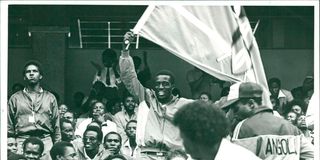
Football legend Austin Origi Oduor flies the Kenyan flag during a past match at Moi International Sports Centre, Kasarani.
According to Ocholla, Oduor had seen first hand the ravages of alcohol on players and he always counselled Ocholla and his fellow imports from Hotstars the late Anthony Ndolo to stay clear of the bottle. Oduor was a teetotaller.
As a player, Oduor had a commanding presence on the pitch that was reassuring to his teammates but a nightmare to the opposite teams. Many who watched him play would easily remember Oduor, running on the rear, both arms spread as he gave cover to the goalie of the day.
It is also worth mentioning that Oduor came from a football pedigree that commanded the local and international fronts for many years. His brother Mike Okoth was part of the all conquering Shabana FC that came and took the then national football league by storm.
Okoth was later to turn into a lethal striker chased after fortune in Belgium where he made a name and a home.
Okoth’s son Divock Origi turned out for English Premier League side Liverpool and was the first player of Kenyan origin to play at a Fifa World Cup when he turned up for Belgium in Brazil 2014. Oduor’s nephew Arnold Origi was the number one goalkeeper for Kenya for many years.
Oduor, Dawo, and Ocholla had recently formed a bunch of former Gor Mahia and Harambee Stars who had been touring many areas of Nyanza as part of a new initiative by the Deputy Chief of Staff at State House Eliud Owallo to promote sports in the area.
Almost every weekend Owallo, who has positioned himself as a leading Gor Mahia supporters, takes the former players on tours where they donate uniforms and other sports equipment to grassroots clubs. Just this past Saturday Oduor was in a similar outreach mission with other players.
Owallo mourned the former player thus: “It is only three days ago that Austin and other former Kenyan soccer internationals paid a courtesy call on me at our Gangu Village home in Asembo.
I remember with nostalgia the memorable moments we have spent together with Austin, the guidance I got from him from time to time, the many initiatives we pursued together in supporting grassroots soccer activities, the conceptualisation and operationalising of the Gor Mahia Legends’ welfare sustainability fund;and the plans we had for the future.
“I have lost a friend; an elder brother; a guardian; and a role model in life.”
Rogers Kadenge, a former high profile footballer and also son to another legend the late Joe Kadenge says that although Oduor played in an era before him, he always looked up to the fallen hero as a mentor in his career.
“He was always close to young players encouraging them and his death is a big blow to all of us who looked up to him,” he said.
Oduor died on Tuesday in Kakamega.
***
After joining Gor and establishing his credentials, Oduor was made the vice captain, deputising the equally mercurial defender who plied his trade both at Gor Mahia and Harambee Stars, John Bobby Ogolla ‘The Six Million Dollar Man’.
With time Oduor would get the armband but the nickname “Makamu” -- deputy remained. Makamu goes to the grave as the only man I know anywhere in the world who played and captained a team to a continental diadem while retaining the name “deputy” all the time.
Fly with the angels, champ!


